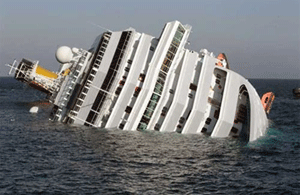According to telegraph. co.uk, the timeline of the night’s events occurred as follows. The granite outcrop had torn a massive hole in its hull at 9:42 pm, when the married couple was enjoying their dinner on the second-floor dining room of the Costa Concordia. The captain allegedly went off-course in the cruise, taking the ship closer to shore than usual. With the hull opened up, water began pouring into the bottom of the ship. Instantly, silverware, plates and glasses began flying off the tables. Lights immediately went out, and came back on. “And things started to tilt,” King remembers.
Within three minutes, passengers were raising concern but had not received any signals from the captain. Crew members were encouraging passengers it was simply an electrical problem, and to stay inside and have a drink, King recalls.
The entire time, King and her husband stayed outwardly calm, but internally panicking. “We were trying to weigh our options, and [Mike] was saying we could swim ashore if we needed to. We were just waiting for some sort of direction, which took a long time.”
The married couple ran to their room, grabbing a few sweatshirts and thankfully, her purse containing her keys and credit cards. “But all the items you buy and pack for a cruise, that all had to be left behind.” King and Stoll quickly put their lifejackets on underneath their clothes, in order to not spread panic to the other passengers.
King recalls that the half-hour orientation the crew members gave at the start of the cruise was a short video similar to that of an airplane safety demonstration. According to King, several passengers did not even attend the training for such emergencies. “We were not taught which lifeboats to go to… it was very minimal.”
The coastguard had been notified after a passenger on the Costa Concordia had called home, and when the coastguard spoke with the captain, Francesco Schettino, he assured him it was an electrical problem and the situation was being taken care of. Ten minutes later, the coastguard made a second phone call to the captain who then admitted that water was entering the ship, yet there was no emergency or reason for concern. King says the crew remained professional, in light of “waiting for direction that never came. They’re trained in emergency procedures but they’re not trained to be coastguards and things like that. They were just as afraid as we were.”
Once King held onto a pipe to keep from slipping at the angle the ship was tilting, she immediately realized the situation was much bigger than she imagined. “This can’t be an electrical problem. The boat doesn’t tip this far,” she says. “Even when we got off the boat, we didn’t know it was going to sink totally until we watched it from the shore.”
Fifty minutes after the ship had run aground, the captain was pressured to send a Mayday signal; another 20 minutes later, he sent a signal for the ship to be abandoned, according to telegraph. co.uk. “When they finally started letting people out, it was chaos. People were shoving and pushing,” King says.
King and Stoll couldn’t fit on the lifeboat they were waiting for, but they managed to squeeze onto a second one. The unspoken rule of women and children being rescued first was not strongly implemented, King says, who also worked hard to not frighten the children. “We were trying to let the kids go first. Everybody was speaking different languages, so nobody was really communicating with each other.” There were 126 Americans out of the 4,200 passengers on board, according to news.sky.com.
In attempting to tie relations to the event, King says the ordeal was “not as extreme as Poseidon, but as we were waiting, the movie Titanic was going through my head.”
There were two moments King felt uncertain if she would make it out alive. “When we were waiting, I thought the ship would just fall and we would be stuck inside. And then when we were on the lifeboat, I thought we could just fall. I remember Titanic…the ship falls and people fly off…that was still in my head.”
It is a captain’s duty to be the last man on ship; however, Schettino reportedly got into a lifeboat at 11:40pm while many passengers, including women and children, were still on board. With the captain off ship, the coastguard assumed responsibility of the situation.
In hearing about the charges being brought against the captain, King believes they are justified. “We didn’t know that he abandoned ship until the next day, and didn’t hear the audio tape until many days later. He is responsible for everyone on that ship.”
The crew members, including bartenders and dancers, she says, were the last people on the ship, making sure all passengers were in lifeboats before they got in themselves. “I think that if he [Schettino] stayed on, there wouldn’t be any lives lost.” The death toll of the Costa Concordia tragedy has reached 17.
They were on the lifeboat heading to the dock, and then had to get onto a ferry for another two hours to get to the nearest hotel in Tuscany, which King wasn’t thrilled about doing. They were brought to a hotel in Rome and waited for more communication, but heard nothing. “We were pretty much dropped off and left.” They then took a taxi to the Embassy for an emergency passport, went to the airport and booked the first flight out. “We were lucky we had a credit card on us, because most people don’t carry things like that on them on a cruise,” King says.
Once she and her husband were safely landed on shore, she ran to the nearest payphone to contact her father, who was not yet aware of the catastrophe.
Several precautions and alternate plans could have been made to prevent the pandemonium, but King’s advice? “The captain should have stayed on course, and he should have called the coast guard right away. There should have been a better plan, and a new captain!” she laughs.
Overall, King appreciates the life lessons the Costa Concordia disaster taught her. “Go with your gut. If you feel like something is wrong, listen to yourself, even when the authority figures are telling you it’s ok. Be overly cautious and pay attention to emergency procedures. Just trust yourself.”
As to how she’s coping with the aftermath of the Costa Concordia, King says only time will tell. “We’re just grateful to be alive, really. We have a really good support system of my friends and family, and even professors have been understanding with me as I try to get my focus back.”
Will King ever set forth on another cruise? “No. First and last,” she sadly smiles.
King is in the psychological counseling graduate program, anticipating graduation in January 2013. She is completing an internship with Ocean Mental Health in Bayville, within the Crisis Diversion Program. She also serves as the Vice President for Wagon- in, a dog rescue organization for Monmouth County.


